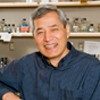
Dr.
Takei, Fumio
BSc, PhD
e-mail:
Lab Website
Academic Rank:
Professor, UBC, Distinguished Scientist
Affiliation(s):
BC Cancer Agency
Location:
Terry Fox Laboratory
Short Bio
Dr. Takei received his PhD from the University of British Columbia (UBC) and completed postdoctoral training in Cambridge, England. He then returned to UBC to lead his own laboratory. He has been working on innate lymphocytes for over 30 years. From 1990 to 2010, he mainly worked on natural killer (NK) cell receptors for MHC class I and regulation of NK cell functions and development. In 2010, he found a unique lymphocyte population, which is now termed group 2 innate lymphoid cell (ILC2), in mouse lungs. He showed that lung ILC2s play a key role in allergic lung inflammation. He is currently investigating the regulation of ILC2 functions and functional and developmental relationship between ILC2s and other lymphocytes.
Academic Backgrounds
- BSc, University of Tokyo, Tokyo, Japan, Biochemistry. 1968
- PhD, University of British Columbia, Vancouver, BC, Immunology. 1976
- Postdoctoral Fellow, University of British Columbia, Microbiology, 1977
- Postdoctoral Fellow, MRC Laboratory of Molecular Biology, Cambridge, England. 1979
Awards & Recognition
Selected Publications
Current Openings & Opportunities
Current Projects In My Lab include
Research
Our current researches focus on innate lymphoid cells in mouse lungs. We are investigating the regulation of group 2 innate lymphoid cell functions, their interaction with other cells and their role in allergic lung inflammation.
Dr. Takei received his PhD from the University of British Columbia (UBC) and completed postdoctoral training in Cambridge, England. He then returned to UBC to lead his own laboratory. He has been working on innate lymphocytes for over 30 years. From 1990 to 2010, he mainly worked on natural killer (NK) cell receptors for MHC class I and regulation of NK cell functions and development. In 2010, he found a unique lymphocyte population, which is now termed group 2 innate lymphoid cell (ILC2), in mouse lungs. He showed that lung ILC2s play a key role in allergic lung inflammation. He is currently investigating the regulation of ILC2 functions and functional and developmental relationship between ILC2s and other lymphocytes.